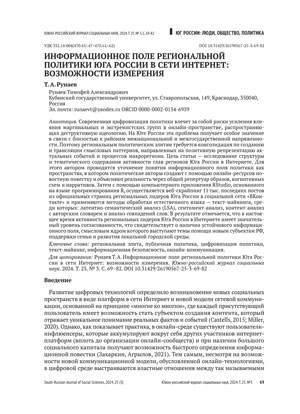Abstract
The contemporary digitalization of politics carries an inherent risk of aggravating the influence of marginalized and extremist groups in the online domain, which disseminate destructive ideologies. In the southern regions of the Russian Federation, this issue assumes particular significance in light of the proximity of these territories to areas characterized by interethnic and interstate tensions. It is therefore necessary for regional political elites to consolidate their position in order to create and disseminate meaningful narratives that portray current events and processes in a positive light at the macro-regional level. The objective of this article is to examine the structure and thematic content of the online activities of regional leaders in southern Russia. In order to achieve this, the author clarifies the concept of the information field of politics as a domain in which political actors construct a news agenda with the assistance of online resources and explain reality through a shared repertoire of images, cognitive schemas and narratives. Subsequently, the RStudio computer application, which is based on the R programming language, was used to web-scrape 11,000 recent posts from the official pages of regional leaders of Southern Russia in the “VKontakte” social network. Natural language processing methods, specifically text mining, were then applied to these posts. These methods included latent semantic analysis (LSA), sentiment analysis, content analysis with the author’s dictionary, and word match analysis. As a result, it can be observed that the online activity of regional leaders in southern Russia is currently characterized by a notable degree of consistency. This suggests the existence of a stable information field, with the semantic core centered on themes of assistance to newly-established constituent entities of the Russian Federation, family support and the advancement of local urban environments.
Keywords
References
Акопова, Т.С., Тихонова, А.В. (2019). Применение индексов в политмаркетинговом исследовании предвыборных кампаний в социальных сетях. На примере президентской кампании в Российской Федерации 2018 г. Известия Иркутского государственного университета. Серия: Политология. Религиоведение, 30, 18–31. DOI: 10.26516/2073-3380.2019.30.18
Дружинин, А.Г. (2022). Новые субъекты Российской Федерации: специфика, тренды, потенциал развития. Научная мысль Кавказа, 4, 62–74. DOI: 10.18522/2072-0181-2022-112-62-74
Дудина, В.И. (2021). «Пересборка социологии»: цифровой поворот и поиски новой теоретической оптики. Социологические исследования, 47(11), 3–11. DOI: 10.31857/S013216250016829-4
Захаркин, Р.А., Аргылов, Н.А. (2021). Инфлюенсеры как медиазначимые другие: современные тренды вторичной социализации. Власть, 29(6), 27–37. DOI: 10.31171/vlast.v29i6.8674
Зимова, Н.С., Фомин, Е.В., Смагина, А.А. (2020). Социальные сети как новый канал взаимодействия общества и власти. Научный результат. Социология и управление, 6(2), 159–171. DOI: 10.18413/2408-9338-2020-6-2-0-11
Капшур, В.В., Барышев, А.А., Чудинов, С.И. (2021). Репрезентация радикальных сообществ в российских социальных медиа: специфика контента и индекс активности. Вестник Томского государственного университета, 467, 133–143. DOI: 10.17223/15617793/467/17
Кастельс, М. (2004). Галактика Интернет. Екатеринбург: У-Фактория.
Коньков, А.Е. (2020). Цифровизация политики vs политика цифровизации. Вестник Санкт-Петербургского университета. Серия 6. Философия. Культурология. Политология. Право. Международные отношения, 13(1), 47–68. DOI: 10.21638/spbu06.2020.104
Крыштановская, О.В. (2019). Элита в сетях: новые формы обратной связи в цифровую эпоху. Цифровая социология, 2(2), 4–11. DOI: 10.26425/2658-347X‑2019-2-4-1
Люк, Д. (2017). Анализ сетей (графов) в среде R. Руководство пользователя. Москва: ДМК Пресс.
Мирошниченко, И.В., Морозова, Е.В. (2017). Сетевая публичная политика: контуры предметного поля. Полис. Политические исследования, 2, 82–102. DOI: 10.17976/jpps/2017.02.06
Мирошниченко, И.В., Рябченко, Н.А. (2018). Сетевая экосистема и инновационные практики в регионах России. В Л.В. Сморгунов (ред.). Публичная политика: институты, цифровизация, развитие: коллективная монография (с. 306–318). Москва: Аспект Пресс.
Савенков, П.А., Ивутин, А.Н. (2022). Методы анализа естественного языка в задачах детектирования поведенческих аномалий. Известия Тульского государственного университета. Технические науки, 3, 358–366. DOI: 10.24412/2071-6168-2022-3-358-366
Сморгунов, Л.В. (2014). Сетевые политические партии. Полис. Политические исследования, 4, 21–37. DOI: 10.17976/jpps/2014.04.03
Флигстин, Н. Макадам, Д. (2022). Теория полей. Москва: Изд. дом Высшей школы экономики.
Anandarajan, M., Hill, Ch., Nolan, T. (2019). Practical Text Analytics. Maximizing the Value of Text Data. Cham: Springer.
Bourdieu, P. (1993). Sociology in Question. London: Sage.
Castells, M. (2015). Networks of Outrage and Hope: Social Movements in the Internet Age. Cambridge: Polity Press.
Grimmer, J, King, G. (2011). General Purpose Computer-assisted Clustering and Conceptualization. PNAS, 108(7), 2643–2650. DOI: 10.1073/pnas.1018067108
Hanna, A. (2013). Computer-aided Content Analysis of Digitally Enabled Movements. Mobilization: an International Quarterly, 18(4), 367–388. DOI: 10.17813/maiq.18.4.m1g180620x7n1542
Kocks, J.N. (2016). Political Media Relations Online as an Elite Phenomenon. Wiesbaden: Springer VS.
Kwartler, T. (2017). Text Mining in Practice with R. Hoboken: John Wiley & Sons.
Lindstedt, N.C. (2019). Structural Topic Modeling for social Scientists: a Brief Case Study with Social Movement Studies Literature, 2005–2017. Social Currents, 6(4), 307–318. DOI: 10.1177/2329496519846505
Martin, J.L. (2003). What is Field Theory? American Journal of Sociology, 109(1), 1–49. DOI: 10.1086/375201
Miller, V. (2020). Understanding Digital Culture. London: SAGE Publications Ltd.
Reed, T.V. (2019) Digitized lives. Culture, Power and Social Change in the Internet Era. New York; London: Routledge.
Wijermars, M. (2021) The Digitalization of Russian Politics and Political Participation. In D. Gritsenko, M. Kopotev, M. Wijermars (Eds.). The Palgrave Handbook of Digital Russia Studies (pp. 15–32). Cham: Palgrave Macmillan.
Wilkerson J., Casas A. (2017). Large-scale Computerized Text Analysis in Political Science: Opportunities and Challenges. Annual Review of Political Science, 20, 529–544. DOI: 10.1146/annurev-polisci‑052615-025542


